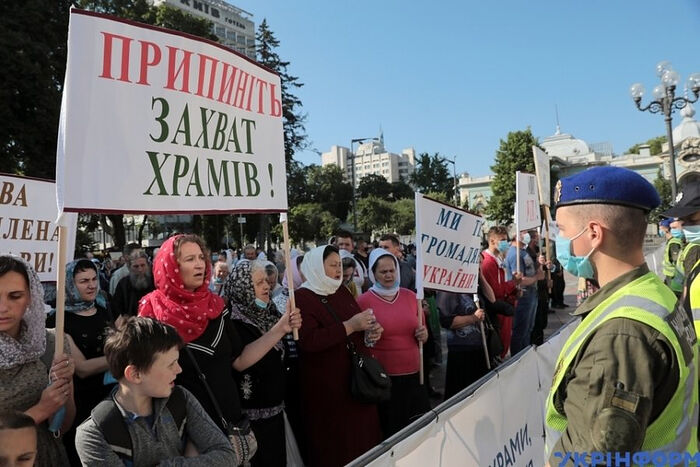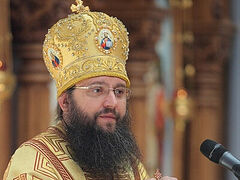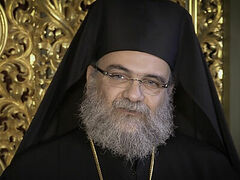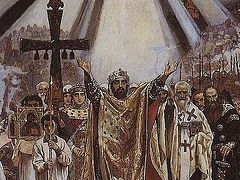We talked with Bishop Victor (Kotsaba) of Baryshevka, head of the Representation of the Ukrainian Orthodox Church (the UOC-MP) to European International Organizations, on the visit of Patriarch Bartholomew of Constantinople to Kiev, the establishment of the “Laity” (“Miryane”) Public Union and other recent events.
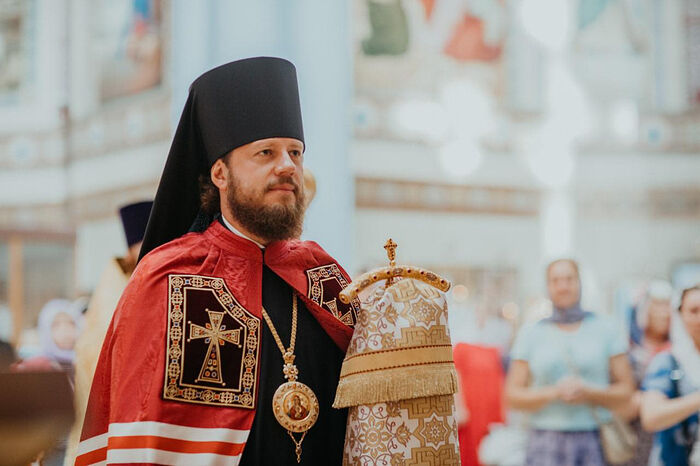 Bishop Victor (Kotsaba) of Baryshevka
Bishop Victor (Kotsaba) of Baryshevka
—Your Eminence, Orthodoxy is going through hard times today. The uncanonical actions of Patriarch Bartholomew of Constantinople have led to a crisis in the Church and the severance of Eucharistic communion with the Patriarchate of Constantinople, along with some bishops from other Local Churches who supported these actions. Please tell us about the current situation of the Church in Ukraine.
—Today, the state of affairs in Ukrainian Church life is a graphic illustration of the words of the Apostle Paul that God’s strength is made perfect in weakness (2 Cor. 12:9). As before, openly hostile acts are being committed against the Ukrainian Orthodox Church. This includes the interference of State officials in the Church sphere, a slander campaign in the media, and arbitrary behavior by local authorities engaged in the illegal re-registration of the UOC-MP communities to the OCU. And the most illustrative example of this enmity is of course the raiding of churches by the OCU supporters. These raids are accompanied by violence against parishioners and sometimes even clergy, threats and intimidation against the faithful, and so on.
It is especially sad that some supporters of the OCU who call themselves Christians even persecute children, sometimes resorting to direct violence. For example, in the village of Zadubrovka of the Chernivtsi region, a ninth grader named Kristina Velushchak at a parent meeting was banned from the graduation ceremony because she is a parishioner of the UOC-MP. And in the village of Sadov of the Volhynia historic region some followers of the OCU beat a sixteen-year-old son of the church rector. The doctors diagnosed him with severe head injuries, hemorrhages and numerous hematomas.
On the other hand, we are witnessing an extraordinary surge of spiritual strength in the faithful and clergy, the unity of communities with their priests, people’s faithfulness to Christ and His Church, and the awareness that we are all brothers and sisters in Christ. The whole Church responds to the pain and suffering of each individual community and each person. It may seem surprising and incredible, but in almost every village where a church was seized (over 100 places, mainly in the western regions of Ukraine) a new one has already been built, or is under construction, or funds are being raised for its construction. Moreover, both monetary support and aid in the form of building materials, church vessels and liturgical items are coming from all over our country.
—The surge of spiritual strength you talk about was clearly and vividly illustrated by the Great Procession in late July this year, the day of the Baptism of Rus’. Its scale and magnificence reaffirmed the Savior’s words that the powers of hell cannot prevail against the Church (cf. Mt. 16:18).
—Yes, that’s true. The number of participants in the Great Procession is growing every year. This year there were 350,000 participants, last year the procession was not held due to the pandemic, in 2019 there were about 300,000 participants, and the year earlier, about 250,000. Interestingly, the Kiev police, who “traditionally” reduce the number of participants by almost ten times on orders from higher-up, testify to the fact that ever more believers are participating in the Great Procession. This clearly indicates that, in spite of any sponsored “opinion polls” and “statistical studies”, the UOC-MP remains the largest Church in Ukraine.
—Nevertheless, the OCU is not ashamed to declare in every corner that their “Church” is rapidly growing thanks to all the new adherents...
—I’d like to ask: Where are all these supporters? Why don’t we see them at processions, in the OCU churches, which stand empty? Cross processions are an important part of the spiritual life of Orthodox Christians. I by no means want to brag about the multitude of participants in the Great Procession and many other prayer actions throughout Ukraine arranged by our Church, but they all testify that the Lord is with us.
—Against this background, the visit of Patriarch Bartholomew to Kiev looked very pathetic. What can you say about this visit?
—Firstly, this visit took place at the invitation of our country’s secular authorities. Therefore, the status in which he was received in Ukraine is unclear. If he came as a cleric, then it was a violation of the constitutional principle of the separation of Church and State. If he was received as a political leader, then—unlike the Vatican, Phanar is not a state.
Secondly, the Ukrainian Orthodox Church not only didn’t invite Patriarch Bartholomew to our country, but also urged him to refrain from such a visit, rightly fearing that it would provoke a new wave of seizures of churches and violation of the rights of the faithful, which did happen in some UOC-MP dioceses. Thus the visit of the primate of the Church of Constantinople cannot be regarded otherwise than an illegal invasion of our canonical territory.
—Nevertheless, by supposedly revoking the 1686 decision to transfer the Metropolis of Kiev to the jurisdiction of the Moscow Patriarchate, Patriarch Bartholomew declared Ukraine his canonical territory?
—Yes, you quite rightly qualified your statement as “supposedly.” Because the decisions of the Synod of the Church of Constantinople of October 11, 2018 on the revocation of the 1686 decree and the reception of the Ukrainian schismatics to Church communion are not just a violation of the Church canons. They also create some fictional “reality” to which the Phanar is inviting everyone, to stay.
By his visit to Ukraine Patriarch Bartholomew has once again demonstrated his persistence in delusion and, despite the obvious failure of his project of the OCU, he continues to insist that this organization is the canonical church in Ukraine, and its head, Epiphany Dumenko, is “Metropolitan of Kiev.” No wonder that the leader of the Ukrainian schismatics, Philaret Denisenko, after leaving the OCU rightly noted that if he himself was under anathema, then Epiphany, “ordained” by him, was not even a priest.
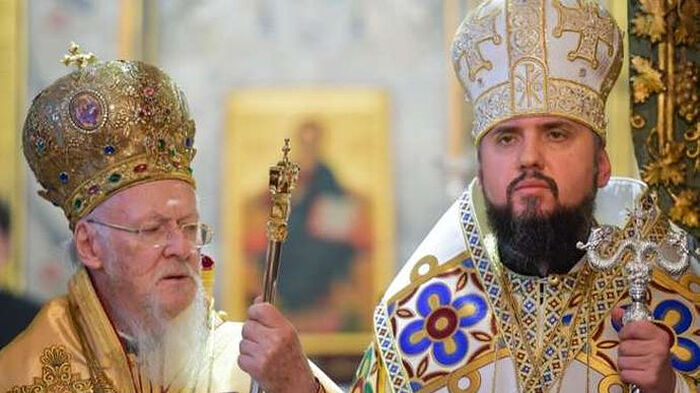 Patriarch Bartholomew and Epiphany Dumenko, the head of the OCU schismatics
Patriarch Bartholomew and Epiphany Dumenko, the head of the OCU schismatics
It is sufficient to recall his reaction to the prayer vigil of the UOC-MP’s faithful outside the Verkhovna Rada (the Parliament of Ukraine). Patriarch Bartholomew refused to meet with the Orthodox flock and listen to the position of the Orthodox in Ukraine. While 10,000 people were waiting for him by the Verkhovna Rada, he, surrounded by police cordons, entered the Rada building from the side entrance and left it through the courtyard. All this demonstrates that Patriarch Bartholomew doesn’t want to know the opinion of millions of Orthodox citizens of Ukraine and is simply hiding from them. In his behavior we can clearly see the style of a militant schismatic. History shows us that most schisms were orchestrated with the support of political forces, and the religious situation in Ukraine demonstrates this as well.
—Vladyka, the prayer vigil outside the Verkhovna Rada was organized by the “Laity” Public Union. Can you tell readers about this movement?
—The “Laity,” as its name implies, is a non-governmental structure that has united believers of all the UOC-MP dioceses, realizing that the future of the Church and its place in Ukrainian society largely depends on their active position. The activities of the “Laity” received the blessing of His Beatitude Metropolitan Onuphry. It was received with great enthusiasm by the Orthodox community and within a short span of time, the local “Laity” branches were officially registered in almost all diocesan centers; the new Orthodox organization continues to grow in members.
—Can we speak of any specific results of the “Laity”‘s activity?
—It depends on what we call “specific results.” Anti-Church laws have not yet been repealed in our country, raids on churches haven’t stopped, the propaganda against the UOC-MP in the media isn’t decreasing in intensity. But the emergence of the “Laity” Public Union has demonstrated to the enemies of the Church that a huge number of believers, including representatives of the arts and science, politicians, journalists, and ordinary citizens of the country are ready to defend the Church of Holy Prince Vladimir, to serve it with their faith, talents and abilities.
The first action of the “Laity”, which took place on June 15 this year, gathered over 20,000 of the faithful. On that day some activists arrived to the Verkhovna Rada and the Office of the President to submit two bills developed by the All-Ukrainian Union of Orthodox Lawyers to help MPs amend the adopted laws that violate the constitutional rights of Ukrainian citizens.
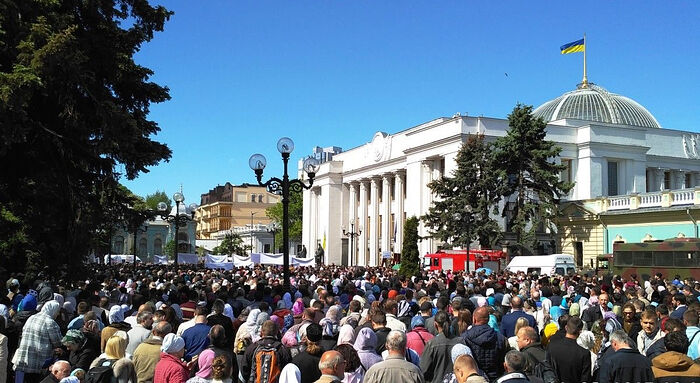 The prayer vigil of UOC-MP believers outside the Verkhovna Rada on August 21, 2021
The prayer vigil of UOC-MP believers outside the Verkhovna Rada on August 21, 2021
Even before Bartholomew’s visit to Kiev, the “Laity” sent an official letter to the Phanar office, in which they invited the Patriarch to a meeting with the UOC-MP faithful. They also prepared a response “tomos”, in which they expressed their disagreement with the actions of the Ecumenical Patriarch in Ukraine. The faithful planned to hand this document to Patriarch Bartholomew during the meeting.
—Did they manage to hand it over to Patriarch Bartholomew?
—No, they didn’t, but this text in Greek was published by Greek Church news agencies. So there is no doubt that Patriarch Bartholomew was informed—the stance of the laity of our Church was conveyed to the Greek-speaking public, and the staff of the Patriarchate of Constantinople must have familiarized themselves with it.
—The establishment of the “Laity” Public Union reminds us of the religious situation in the seventeenth century when Orthodox brotherhoods were founded to oppose the Unia in Ukraine. Can we say that the “Laity” is reviving such brotherhoods in the contemporary environment?
—Brotherhoods appear when the Church is persecuted and under pressure from the authorities. In the seventeenth century, brotherhoods played a very important role in the very fact that Orthodoxy in Ukraine was not destroyed under pressure from Catholics and Uniates. The brotherhoods defended the rights of the Orthodox population, were engaged in the publication and distribution of Orthodox literature, the education of people, charitable work, etc. Today the “Laity” is doing practically the same thing, only using modern methods to protect their rights, and modern means of communication.
But there are also several significant differences. At the turn of the sixteenth century, the overwhelming majority of bishops of the Kiev Metropolia entered into the Unia with Rome. They did it openly or secretly, thus losing the confidence of the faithful. As a rule, the brotherhoods received broad rights from the Patriarchate of Constantinople—they were beyond the local bishops’ control and even exercised a sort of oversight to prevent the Orthodox bishops from joining the Unia.
The current situation in Ukraine is, in this respect, completely different. Only one ruling bishop and one vicar bishop of the UOC-MP defected to the OCU, while all the other bishops remained faithful to the Church without succumbing to threats and persuasion. So, the “Laity” Union doesn’t act independently, but with the blessing of the Church hierarchy.
—Many people compare the situation in Ukraine with that of Montenegro. In your opinion, are they similar?
—They are very similar in many ways. In both Montenegro and Ukraine the authorities are opposing the canonical Church. Since the early 1990s, there has been in Ukraine a Church schism instigated by the authorities; in Montenegro, the so-called “Montenegrin Orthodox Church” appeared as well. The Ukrainian Government adopted anti-Church laws; and in Montenegro they went even further—they passed a law according to which the State was entitled to seize most church buildings and property of the canonical Church and transfer them to the schismatics.
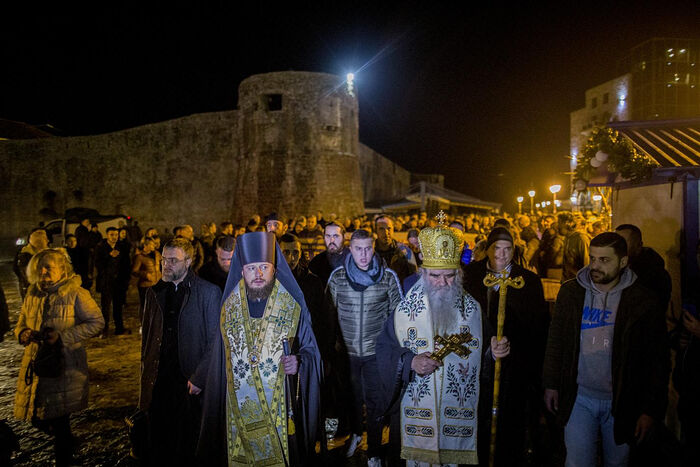 The cross procession in Budva on January 28, 2020
The cross procession in Budva on January 28, 2020
In both our countries the faithful stood up for the Church in large numbers. Our bishops, including His Beatitude Metropolitan Onuphry, visited Montenegro and participated in processions there. The fact that on some days in Montenegro up to half of the country’s population walked in religious processions was very impressive and served as an example for us in defending our rights.
Another significant point is that both in Montenegro in the parliamentary elections and in Ukraine in the presidential elections the forces that had placed their bets on enmity with the Church suffered a defeat. However, there is also a difference. During the 2020 election campaign in Montenegro, the reposed Metropolitan Amfilohije of Montenegro and the Littoral had to openly call on the citizens of the country not to vote for the political forces that were hostile to the canonical Church. This was a forced measure, although it is not typical for the Church to interfere in political life. Today in Ukraine we don’t deem it possible to meddle in political battles or call on the UOC-MP members to vote for certain parties. We hope that new governments won’t interfere in the affairs of the Church and will contribute to the normalization of religious life in Ukraine.
—In conclusion, please tell us about your activities as the head of the Representation of the UOC-MP to European International Organizations.
—We live in a world in which international organizations have a serious impact on domestic policy in different countries. In some cases, this impact occurs as a result of specific legal mechanisms, in other cases it is a softer, informational and ideological influence. Experience of recent years suggests the following: When the UOC-MP representatives speak at international human rights platforms, such as the UN and OSCE, where we present documented facts citing violations of the rights of the faithful in our country, an information environment is created, against the backdrop of which it isn’t so easy for our Establishment to brush aside the statements and complaints brought to the attention of the foreign public. The authorities are simply obliged to react somehow.
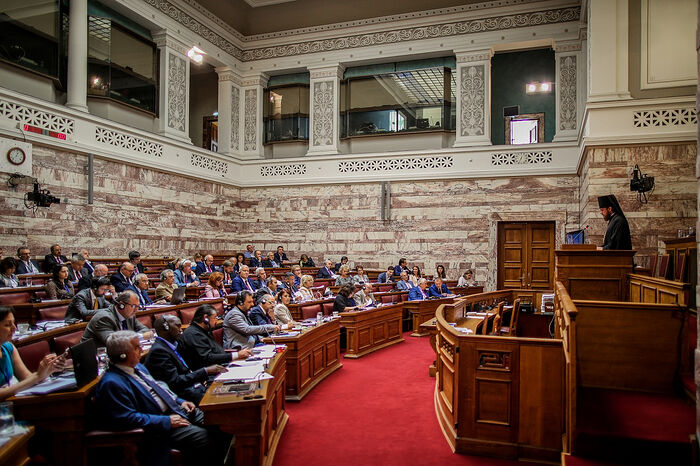 The session of the XXV Jubilee Inter-parliamentary Assembly of Orthodoxy. Athens. June 25, 2018
The session of the XXV Jubilee Inter-parliamentary Assembly of Orthodoxy. Athens. June 25, 2018
And it is very important not to give up. A drop wears away the stone. For example, OSCE representatives come to the scenes of interfaith conflicts and can directly monitor the situations. On the UN and OSCE websites one can find systematized information on violations of the rights of the UOC-MP’s faithful and religious communities.

